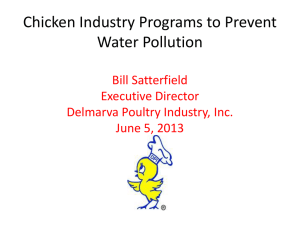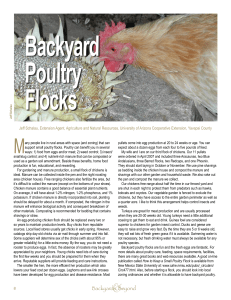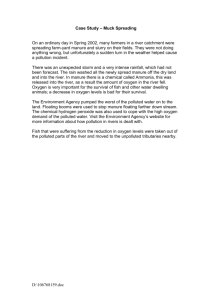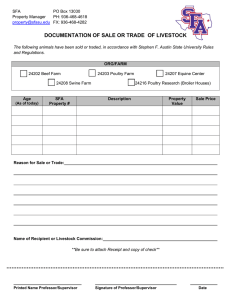Commercial Poultry
advertisement
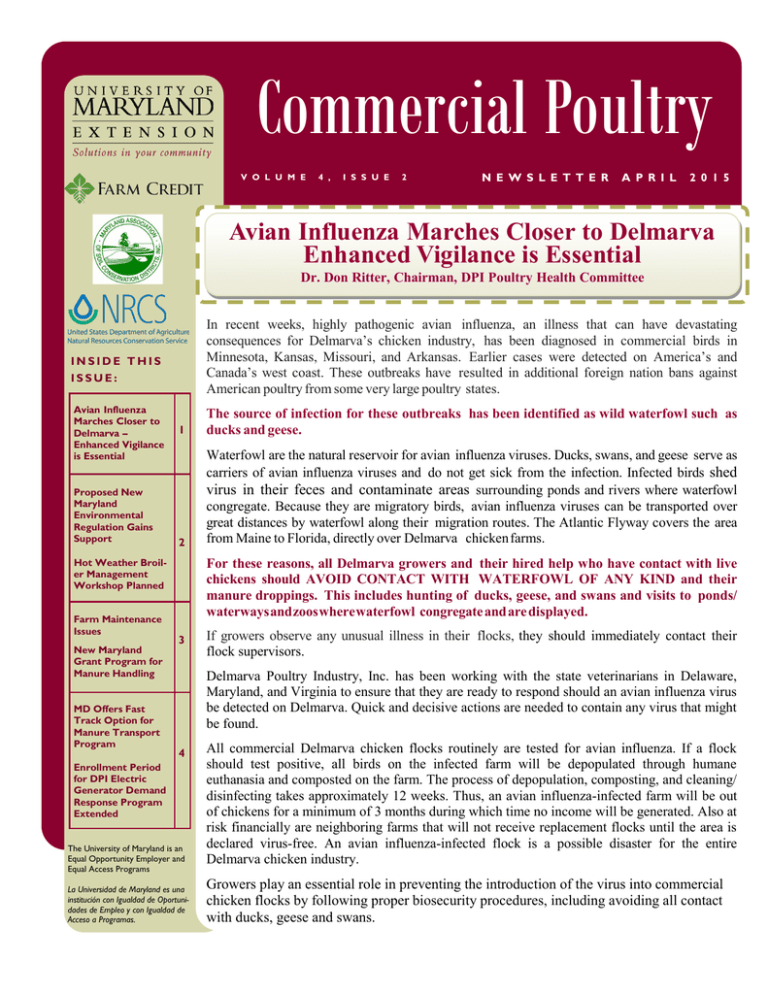
Commercial Poultry V O L U M E 4 , I S S U E 2 N E W S L E T T E R A P R I L 2 0 1 5 Avian Influenza Marches Closer to Delmarva Enhanced Vigilance is Essential Dr. Don Ritter, Chairman, DPI Poultry Health Committee In recent weeks, highly pathogenic avian influenza, an illness that can have devastating consequences for Delmarva’s chicken industry, has been diagnosed in commercial birds in Minnesota, Kansas, Missouri, and Arkansas. Earlier cases were detected on America’s and Canada’s west coast. These outbreaks have resulted in additional foreign nation bans against American poultry from some very large poultry states. INSIDE THIS ISSUE: Avian Influenza Marches Closer to Delmarva – Enhanced Vigilance is Essential Proposed New Maryland Environmental Regulation Gains Support 1 The source of infection for these outbreaks has been identified as wild waterfowl such as ducks and geese. 2 Waterfowl are the natural reservoir for avian influenza viruses. Ducks, swans, and geese serve as carriers of avian influenza viruses and do not get sick from the infection. Infected birds shed virus in their feces and contaminate areas surrounding ponds and rivers where waterfowl congregate. Because they are migratory birds, avian influenza viruses can be transported over great distances by waterfowl along their migration routes. The Atlantic Flyway covers the area from Maine to Florida, directly over Delmarva chicken farms. For these reasons, all Delmarva growers and their hired help who have contact with live chickens should AVOID CONTACT WITH WATERFOWL OF ANY KIND and their manure droppings. This includes hunting of ducks, geese, and swans and visits to ponds/ waterways and zoos where waterfowl congregate and are displayed. Hot Weather Broiler Management Workshop Planned Farm Maintenance Issues New Maryland Grant Program for Manure Handling MD Offers Fast Track Option for Manure Transport Program 3 If growers observe any unusual illness in their flocks, they should immediately contact their flock supervisors. Delmarva Poultry Industry, Inc. has been working with the state veterinarians in Delaware, Maryland, and Virginia to ensure that they are ready to respond should an avian influenza virus be detected on Delmarva. Quick and decisive actions are needed to contain any virus that might be found. 4 Enrollment Period for DPI Electric Generator Demand Response Program Extended The University of Maryland is an Equal Opportunity Employer and Equal Access Programs La Universidad de Maryland es una institución con Igualdad de Oportunidades de Empleo y con Igualdad de Acceso a Programas. All commercial Delmarva chicken flocks routinely are tested for avian influenza. If a flock should test positive, all birds on the infected farm will be depopulated through humane euthanasia and composted on the farm. The process of depopulation, composting, and cleaning/ disinfecting takes approximately 12 weeks. Thus, an avian influenza-infected farm will be out of chickens for a minimum of 3 months during which time no income will be generated. Also at risk financially are neighboring farms that will not receive replacement flocks until the area is declared virus-free. An avian influenza-infected flock is a possible disaster for the entire Delmarva chicken industry. Growers play an essential role in preventing the introduction of the virus into commercial chicken flocks by following proper biosecurity procedures, including avoiding all contact with ducks, geese and swans. PAGE 2 Proposed New Maryland Environmental Regulation Gains Support Maryland Governor Larry Hogan, the Maryland Department of Agriculture, and leading Democrats in the Maryland General Assembly on March 18 reached agreement on a new Phosphorus Management Tool regulation that has received support from agricultural groups including Delmarva Poultry Industry, Inc. and some groups in the environmental industry. This will halt an effort to place this farm management tool into state statute, a situation that would limit the state's ability to make changes if changes are indicated. A regulation allows a more flexible system of change. The new proposal offers a common sense plan to limit farmland applications of phosphorus, with full implementation by 2024. It also allows, if necessary, two one-year pauses in the implementation schedule if there are not adequate resources to help chicken growers struggling to find adequate disposal areas for their manure due to less farmland being eligible for manure applications. An advisory committee will meet at least annually to study the manure issues and make recommendations to the Maryland Secretary of Agriculture on the level of available resources. One of the keys to smooth implementation of this new farm management program is the creation of facilities that will convert chicken manure into value-added products such as fertilizers, energy, or something else. Delmarva Poultry Industry, Inc. continues to work with companies interested in developing these alternative use facilities. Hot Weather Broiler Management Workshop Planned Chicken growers are invited to an on-the-farm workshop on May 20 to learn about hot weather management. Sponsored by Cooperative Extension of the University of Maryland and University of Delaware, the program will offer presentations on various topics. Growers can pick and choose which sessions they wish to attend. The program will take place at the Ray and Sheila Tull farm at 3557 Woodpecker Road west of Seaford, Delaware. Demonstrations and workshops will cover these topics: • Maximizing Effective House Temperature in Market-aged Broilers • Summertime Brood Chamber Cooling and Reducing Heat Stress in Young Birds • Considerations for Managing Heat Loss Mortality • Generator Management and Electrical Inspections • Production Site Maintenance • Marketing Manure to Third-party Users • Utility Considerations for Tunnel Ventilation Upgrades • Recordkeeping for CAFO Permits and Inspections • Perdue AgriRecycle Plant tours (transportation provided) There is no charge to attend, but preregistration is required by May 15. All registrations include the full-day program and lunch. Register online by visiting: https://www.eventbrite.com/e/2015-poultrygrowers-field-day-tickets-15897956215 or by contacting Lisa Collins at lcollins@udel.edu or (302) 856-2585 extension 702. Parking for this event will be at the Gethsemane United Methodist Chur ch at 2701 Woodland Fer r y Road west of Seaford. Shuttles will be available to and from the Tull farm. For more information contact Bill Brown: brown@udel.edu or call (302) 236-1887. COMMERCIAL POULTRY PAGE 3 Farm Maintenance Issues Jim Passwaters, DPI Vegetative Environmental Coordinator A restaurant critic once said that whenever he critiques a restaurant, he visits the public restroom first. If it is dirty, he wonders what the kitchen, hidden from the public, looks like. The same principal applies to landscapes around homes and farms. If the area viewed by the public is nasty, what does the area hidden from view look like? I was always taught first impressions make lasting impressions. Some simple maintenance tasks go a long way to improve first impressions. The first is maintaining the entryway. Keeping the road maintained gives an impression of tidiness. Eliminating pot holes removes mud puddles that can be tracked onto the public roadway. The truck drivers will like this as well. I have been on farms that create a nice landscaped bed around their farm signs. Again, first impressions. This small feature infers a sense of pride in being the owner of a farm. Next, keep the grass mowed. I have been on many farms where it appears that their mowers have died of loneliness. Now I realize that some folks will claim that environmental agencies want to see vegetation. I can assure you that a well maintained grassy area is quite acceptable. No one wants to see a bunch of out-of-control weeds spreading seeds all around. Weed control around the poultry farm is another practice that should be incorporated on every farm. I have seen weeds growing halfway up the cooling pads. Not only is this unsightly, but I presume it makes the fans less efficient. Many chemical sprays are available that are effective at eliminating the weeds and are quite inexpensive. Trash disposal is important as well. I have seen farms that have huge trash piles that include things like insulation, refrigerators, couches, and more. Then lightning strikes and the pile burns. Wonderful smells burst forth spreading throughout the neighborhood. These are not the typical agriculture smells that we are all so fondly aware of. Trash piles also attract rodents and may be illegal in some areas. Modern poultry farms are million dollar investments. Simple maintenance issues can protect the investment and improve relationships with non-farmers. Everyone is encouraged to properly maintain their farm. For those that find time is an issue, consider contracting the work out. For more information or recommendations feel free to contact me at passwaters@dpichicken.com or (302) 236-0470. New Maryland Grant Program for Manure Handling Delmarva Poultry Industry, Inc. - In Action The Maryland Department of Agriculture has announced that cost-share grants are available to help farmers cover the cost of injecting or incorporating manure and other eligible organic nutrients into cropland as required by Maryland’s nutrient management regulations. Maryland’s revised nutrient management regulations require farmers to inject or incorporate manure into the soil within 48 hours of application. It is thought this action will help prevent the movement of nutrients into waters of the state. Assistance is available to hire custom operators, rent or lease equipment, or offset operating costs associated with using secondary tillage equipment needed to incorporate or inject manure into the soil. Farmers should visit their local soil conservation district office as soon as possible to apply. Applications will be accepted until all funds are fully committed. For more information, contact MDA at 410-841-5864. COMMERCIAL POULTRY PAGE 4 Maryland Offers Fast Track Option for Manure Transport Program New Application Can be Processed Within 48 Hours of Receipt The Maryland Manure Transport Program has launched a new streamlined application process labeled the “FastTrack” option. Applicants will complete a shortened form that can be processed within 48 hours of receipt by the Maryland Department of Agriculture. The ‘Fast Track’ option was created to make the application process easier, faster and more user friendly for those transporting and land applying poultry litter. Under the Fast-Track application process, MDA will continue to: • Check nutrient management and MACS compliance • Perform an animal health check • Verify the poultry company contracting with the sending poultry operation Once these checks are completed, a conditional approval will be given to allow the poultry litter to be transported to a receiving farm. If there are problems that arise because of the above compliance checks, the application may be delayed or denied. When using the "Fast-Track" process, the nutrient management components (soil tests, manure nutrient analysis, and manure application recommendations) will be required before cost share is provided to determine eligibility and payment amount. The applicant choosing the ‘Fast Track’ option assumes responsibility for adhering to program requirements. Failure to meet program requirements can impact eligibility to receive payment. The Manure Transport Program was established in 1998 to help chicken growers cover the costs of transporting excess manure. Growers with high soil phosphorus levels or inadequate land to properly use their manure can receive cost-share assistance of up to $18 per ton to transport excess manure to other farms in accordance with an approved nutrient management plan or to alternative use facilities. In FY 2014, The Maryland Department of Agriculture provided $608,259 in grants to transport 118,995 tons of manure - more than double the amount of manure transported the previous year. More than 39 percent of this tonnage was shipped to alternative use facilities and not land applied in the watershed. Delmarva chicken companies provided matching funds to transport poultry litter, bringing the total amount of financial support provided to farmers in FY 2014 through the Manure Transport Program to $1.03 million. Enrollment Period for DPI Electric Generator Demand Response Program Extended Delmarva Poultry Industry, Inc. - In Action The enrollment period has been extended for the new Delmarva Poultry Industry-sponsored electric generator Demand Response Program to give more growers a chance to earn up to a thousand dollars or more for making their electric generators available to the local power grid during the summer at times of high electric demand. Working with Ed Jackson of Affinity Energy Management, DPI enrolled several dozen growers, the first time DPI has offered this type of member benefit. Growers who do not join this year will have another opportunity at the start of next year. For more information about how to take advantage of this money-making DPI program, contact Ed Jackson at 302-218-8920 and edjacksonenergy@aol.com. COMMERCIAL POULTRY
